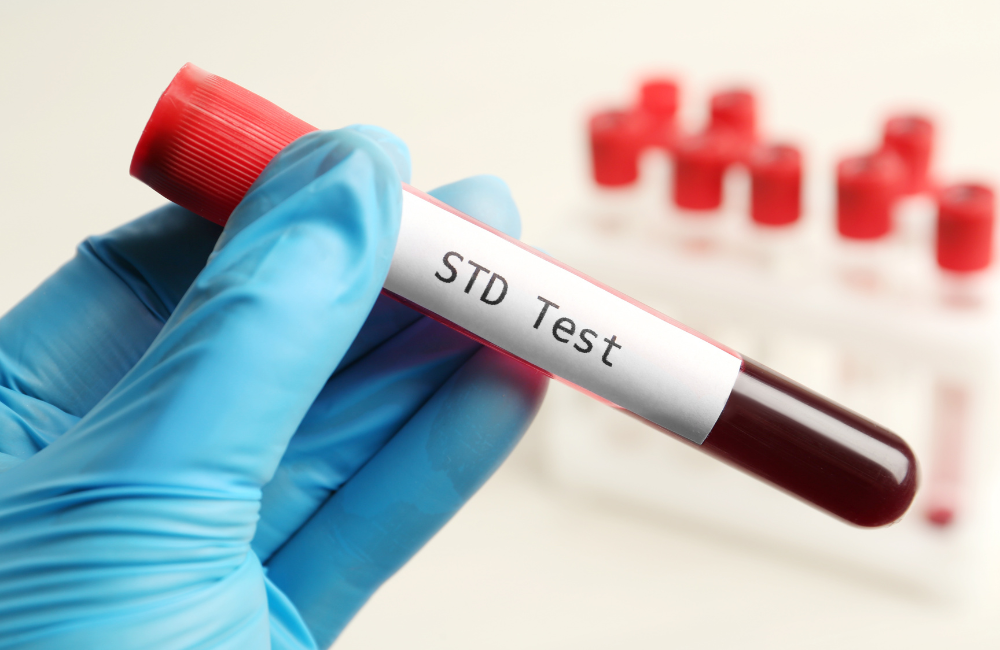
When it comes to your sexual health, knowledge is power. Many people associate sexually transmitted diseases (STDs) solely with sexual intercourse, but it’s essential to understand that some STDs can be contracted without having sex. Regular STD testing in Stamford, CT, is crucial to maintaining your well-being. Let’s explore the STDs you can catch without having sex and why you should prioritize getting tested.
The short answer is yes, you can get STDs without sex. While sexual contact is the primary mode of transmission for most sexually transmitted diseases (STDs), it’s important to understand that there are alternative routes through which these infections can be spread. Being aware of these non-sexual transmission methods is vital to protecting yourself and seeking timely STD testing in Stamford, CT, and treatment when necessary.
When it comes to STDs, knowledge is a powerful tool, highlighting the need for regular STD testing in Stamford, CT. Many people think that sexual intercourse is the only way to contract these infections, but that’s not entirely true. Some STDs can be transmitted through various non-sexual means, and understanding these alternative transmission routes is crucial to safeguarding your sexual health.
Beyond sexual contact, there are several alternative ways in which sexually transmitted diseases (STDs) can be transmitted. Understanding these non-sexual transmission methods is crucial to protect your health and the health of others.
Here’s a list of some of the primary ways to get STDs without sex:
Sharing needles or other drug paraphernalia for intravenous drug use is a significant and well-documented risk factor for contracting bloodborne infections such as HIV and Hepatitis C. When individuals share contaminated needles, they inadvertently introduce infected blood directly into their bloodstream. This places them at risk of contracting these life-altering infections and underscores the critical importance of regular STD testing in Stamford, CT, among individuals engaged in intravenous drug use. Timely and comprehensive STD testing in Stamford, CT, can help detect these infections early on, enabling individuals to seek appropriate medical treatment and take steps to prevent further transmission.
Pregnant women with certain STDs, including syphilis and HIV, can inadvertently transmit the infection to their newborns during childbirth or through breastfeeding. This non-sexual mode of transmission highlights the need for comprehensive prenatal care, including routine STD testing in Stamford, CT, during pregnancy. Timely medical interventions and appropriate treatment can significantly reduce the risk of mother-to-child transmission, safeguarding the health of both mother and baby. Ensuring pregnant women receive proper medical care and STD testing in Stamford, CT, is crucial in preventing these infections from spreading to the next generation.
Some STDs, such as herpes (HSV-1 and HSV-2), can be spread through direct skin-to-skin contact, even without sexual intercourse. Activities like kissing or touching a herpes sore can lead to transmission. Additionally, sharing personal items like towels and razors can pose a risk if they come into contact with infected skin or bodily fluids. To reduce the risk of transmission through these non-sexual means, individuals should be aware of their STD status through regular STD testing in Stamford, CT. Knowing your status allows for informed decisions about intimate contact and helps prevent the inadvertent spread of infections.
While not considered traditional sexual intercourse, oral-genital contact can transmit STDs like herpes, gonorrhea, and syphilis. Engaging in safe oral sex practices, such as using barrier methods like dental dams or condoms, is essential to reduce the risk of transmission. Additionally, regular STD testing in Stamford, CT, is critical for individuals engaging in oral-genital contact to monitor and manage their sexual health effectively. STD testing in Stamford, CT, helps identify infections early, facilitating timely treatment and preventing further transmission.

Although sexual contact is the primary mode of transmission for most sexually transmitted diseases (STDs), it’s important to recognize that certain infections can be contracted through non-sexual means. Understanding the potential for these STDs to spread without sexual contact is crucial for maintaining good sexual health. Below is a list of some common STDs that can be transmitted through non-sexual routes:
Human Immunodeficiency Virus (HIV) is one of the STDs you can get without intercourse. Needle sharing among intravenous drug users is a significant risk factor for HIV transmission. Additionally, mother-to-child transmission can occur during childbirth or through breastfeeding if the mother is infected with HIV. Regular STD testing in Stamford, CT, is essential for individuals engaged in high-risk behaviors and for pregnant women to prevent transmission.
Here are the symptoms of HIV you should look out for:
Many individuals with HIV experience an initial flu-like illness, known as acute retroviral syndrome, within 2 to 4 weeks after contracting the virus. This syndrome often presents with symptoms such as fever, chills, night sweats, and general fatigue. It’s important to note that these symptoms can be mistaken for other common illnesses, making it essential to consider HIV testing if you have engaged in high-risk behaviors or suspect potential exposure.
Persistent fatigue and a general lack of energy are hallmark symptoms of HIV infection, especially during the early stages. This persistent tiredness can significantly impact daily life and is often accompanied by a sense of weakness.
The immune system’s response to HIV infection often results in swollen and tender lymph nodes in various body parts, such as the neck, armpits, or groin. These lymph nodes may be noticeable as small, pea-sized lumps under the skin. The swelling indicates that the immune system is attempting to combat the virus.
An uncomfortable sore throat and difficulty swallowing are among the early symptoms of HIV infection. This persistent symptom may lead individuals to seek medical attention, prompting further evaluation and testing.
Some individuals with HIV develop a characteristic red or purplish rash on the skin or mucous membranes. This rash is often itchy and can vary in appearance. It may consist of flat or raised lesions, and its presence should prompt consideration of HIV testing, particularly when accompanied by other symptoms.
Muscle and joint pain are common in the early stages of HIV infection and may be mistaken for other conditions. These symptoms can range from mild discomfort to severe pain and may affect various body parts.
Hepatitis C is primarily spread through contact with infected blood and is one of the STDs you can get without intercourse. Needle sharing, particularly among individuals using intravenous drugs, is a common route of transmission. Hepatitis C can also be transmitted through contaminated needles used for medical procedures, tattooing, or body piercing. Regular STD testing in Stamford, CT, for Hepatitis C is vital for individuals at risk to detect the infection early and prevent further transmission.
Here are the telltale signs and symptoms of Hepatitis C:
Jaundice is a telltale sign of Hepatitis C and often one of the first noticeable symptoms. It results from the buildup of bilirubin, a yellow pigment, in the body. In individuals with Hepatitis C, the liver’s ability to process bilirubin is compromised. This leads to a distinctive yellowing of the skin and the whites of the eyes (sclera). Jaundice is a clear indicator of liver dysfunction and a compelling reason to seek immediate medical evaluation and STD testing in Stamford, CT, for Hepatitis C.
Hepatitis C can lead to changes in urine color, typically causing it to become dark or tea-colored. This alteration in urine color results from the excess bilirubin circulating in the bloodstream. Dark urine can be an early warning sign of Hepatitis C and should prompt individuals to consider STD testing in Stamford, CT, for this infection.
Stools that become pale or clay-colored are another distinctive symptom of Hepatitis C. This change in stool color is directly linked to disruptions in the body’s ability to process bilirubin due to liver dysfunction. Pale stools can be an alarming indication of liver issues and should not be ignored. Seeking prompt medical attention and undergoing Hepatitis C STD testing in Stamford, CT, is crucial in such cases.
Itchy skin, or pruritus, is a bothersome symptom that some people with Hepatitis C experience. The itching can vary in intensity and may affect generalized areas or specific regions of the body. Itchy skin can significantly impact an individual’s quality of life, and its presence should raise suspicion of underlying liver-related issues, warranting STD testing in Stamford, CT, for Hepatitis C.
Joint pain, known as arthralgia, is a symptom that may affect individuals with Hepatitis C. While this pain can vary in severity, it can contribute to overall discomfort and reduced mobility. Recognizing joint pain as a potential symptom of Hepatitis C highlights the importance of seeking STD testing in Stamford, CT, especially if other symptoms are present.
Hepatitis C can lead to fluid accumulation in the abdomen, a condition known as ascites. This results in abdominal swelling and discomfort. Ascites are a significant sign of advanced liver disease and require immediate medical attention. If abdominal swelling is observed, STD testing in Stamford, CT, for Hepatitis C should be pursued without delay.
Herpes simplex viruses (HSV-1 and HSV-2) are two of the STDs you can get without intercourse. Activities like kissing, touching herpes sores, or sharing personal items like towels or razors can lead to transmission. Regular STD testing in Stamford, CT, and awareness of one’s herpes status can help individuals take precautions to avoid spreading the virus through non-sexual contact.
Here are the hallmark symptoms of the two types of herpes:
Oral herpes, caused by the herpes simplex virus type 1 (HSV-1), is often characterized by the development of cold sores or fever blisters around the mouth or on the face. These sores are small, fluid-filled blisters that can be painful and are typically preceded by tingling or itching sensations. During a primary outbreak, individuals may also experience flu-like symptoms such as fever, headache, and swollen lymph nodes.
Genital herpes, primarily caused by herpes simplex virus type 2 (HSV-2), manifests as painful sores or blisters in the genital or anal area. Like oral herpes, the initial outbreak of genital herpes may be associated with flu-like symptoms like fever, headache, and swollen lymph nodes. Genital herpes is characterized by recurrent outbreaks, varying in frequency and severity among affected individuals.
Syphilis is primarily a sexually transmitted infection, but it can also be transmitted through non-sexual means in some rare cases. Direct contact with syphilis sores or rashes can lead to transmission. While non-sexual transmission is less common, it highlights the importance of STD testing in Stamford, CT, for individuals at risk or those who may have come into contact with syphilis sores.
Here are telltale signs of syphilis:
Secondary syphilis is characterized by a distinctive skin rash that may appear as rough, reddish-brown spots on the palms of the hands and soles of the feet. The rash can also affect other body parts and may not always be accompanied by itching.
In secondary syphilis, individuals may experience flu-like symptoms, including fever, fatigue, headache, and muscle aches. These symptoms can be similar to those of a common cold or the flu, but they are potential indicators of syphilis infection.
Swollen and tender lymph nodes are a characteristic feature of secondary syphilis. Lymph nodes are part of the body’s immune system and often become enlarged as they respond to the presence of the syphilis infection. This swelling is typically painless but should be examined by a healthcare professional.
Some individuals with secondary syphilis may develop a sore throat accompanied by white patches in the mouth or throat. This symptom can be uncomfortable and should be evaluated, especially if there is a risk of syphilis exposure.
Secondary syphilis can lead to hair loss, often occurring in patches. The hair loss can be distressing for affected individuals, and it serves as another potential indicator of syphilis infection.

According to DOCS Urgent Care Stamford, the finest clinic for STD testing in Stamford, CT, getting tested is a proactive and responsible step toward maintaining your sexual health. Many STDs can be asymptomatic, meaning they may not show noticeable symptoms, yet they can still lead to serious health complications if left untreated. Regular STD testing in Stamford, CT, is crucial for your well-being and the prevention of further transmission to sexual partners. Let’s explore the key reasons why you should prioritize STD testing:
One of the primary reasons for undergoing STD testing in Stamford, CT, is the opportunity for early detection and treatment. Early diagnosis of STDs is vital because it enables prompt medical intervention, preventing the infection from progressing and developing potential complications. In many cases, STDs can be effectively treated with antibiotics or other medical therapies when identified early. This early treatment significantly improves long-term health outcomes and reduces the risk of severe consequences associated with untreated infections.
Being sexually active comes with the responsibility to protect your and your sexual partners’ health. STD testing in Stamford, CT, is crucial in safeguarding your partners from potential exposure to STDs. Knowing your STD status allows you to take appropriate precautions, such as using condoms or discussing your status openly with your partners. These measures protect your partners and contribute to the overall reduction of STD transmission within the community.
Many STDs, if left untreated, can lead to serious and sometimes irreversible complications. For example, untreated chlamydia and gonorrhea can cause pelvic inflammatory disease (PID) and infertility in women. Syphilis, when not addressed promptly, can result in severe organ damage. Regular STD testing in Stamford, CT, helps prevent these complications by identifying infections early, allowing for timely treatment to mitigate the potential harm they can cause. Protecting your long-term health and fertility is a significant motivation for undergoing regular testing.
Knowing your STD status provides peace and reduces the anxiety associated with potential infections. A negative test result can alleviate concerns and reassure you about your sexual health. On the other hand, if your test results are positive, you can immediately address the infection, which can bring peace of mind in knowing that you are taking steps to manage your health.
If you are sexually active and test positive for an STD, being aware of your status allows you to take measures to reduce the risk of transmitting the infection to others. Practicing safe sex, using condoms, and informing your sexual partners can help prevent the spread of STDs. This is particularly important for individuals engaging in high-risk sexual behaviors or those who may be asymptomatic carriers of infections.

When it comes to your sexual health, knowledge is indeed power. Regular STD testing in Stamford, CT, is essential to taking control of your well-being and ensuring the safety of both yourself and your sexual partners. Don’t wait; take charge of your health today. At DOCS Urgent Care Stamford, we provide convenient and confidential STD testing services, with results available within 20 minutes. Take the proactive step to safeguard your sexual health.
Schedule your STD testing appointment with DOCS Urgent Care Stamford now!



During this surge in COVID-19 cases, our primary focus is meeting the high demand for tests, and we are seeing higher than usual wait times. This means we are unable to answer most phone calls. Please know that our teams are working very hard during this time to care for as many patients as safely as possible. Please click the button below for answers to common questions. We appreciate your understanding.